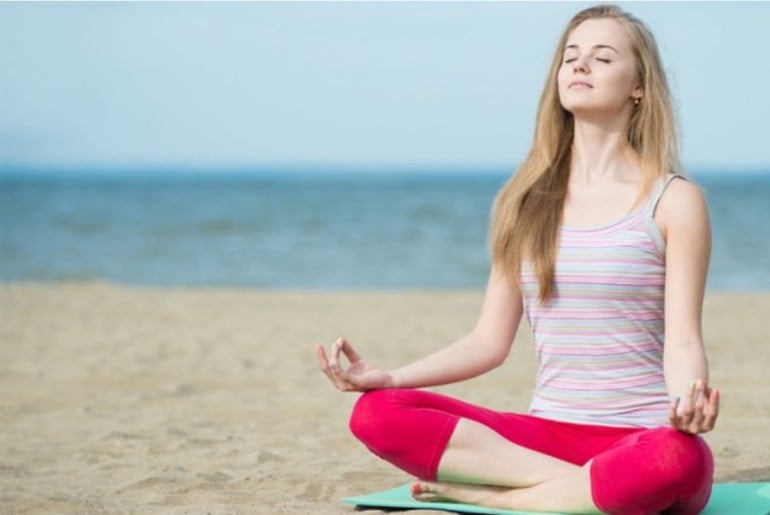
Insomnia is a common yet debilitating condition that affects millions of people worldwide. It can have a significant impact on one’s mental, emotional, and physical health, leaving individuals feeling fatigued, anxious, and unable to perform day-to-day activities efficiently. For years, I, Neha Sharma, struggled with chronic insomnia. After trying numerous medications, sleep aids, and lifestyle changes, I finally found relief through yoga. This case study and testimonial chronicle my journey of battling insomnia and how yoga became my ultimate solution.

Table of Contents
Background: The Struggle with Insomnia
I am Neha Sharma, a 39-year-old marketing professional. My battle with insomnia began in my late 20s, but it worsened significantly after I started working at a high-pressure job in my early 30s. At first, I would have trouble falling asleep on occasion, especially after a stressful day. But over time, the episodes of sleeplessness became more frequent, and eventually, I found myself lying awake in bed for hours every night, unable to fall asleep or stay asleep.
The constant exhaustion started to take a toll on my physical and mental health. I was always tired, irritable, and unable to focus at work. My energy levels were low, my mood was volatile, and I felt constantly stressed and overwhelmed. I began relying on over-the-counter sleep medications and prescription sleep aids to knock myself out at night. While these medications helped me fall asleep, they often left me groggy in the morning, and the cycle of poor sleep and dependence on pills continued.
I sought help from various doctors, including a sleep specialist, who diagnosed me with chronic insomnia. My treatment plan involved sleep hygiene recommendations, medication, and cognitive behavioral therapy for insomnia (CBT-I). However, despite following the prescribed routines, I found little improvement. The side effects of medications, combined with the persistent lack of restful sleep, left me feeling hopeless.
Medical Tests and Consultation: A Formal Diagnosis
During my initial consultation with the sleep specialist, I underwent several diagnostic tests to evaluate the underlying causes of my insomnia:
Polysomnography (Sleep Study):
This test showed that while I was physically capable of sleeping, I spent an unusually high percentage of time in lighter sleep stages (stages 1 and 2), with very little time spent in deep sleep (stage 3) or REM sleep. This disrupted my sleep cycle and left me feeling unrefreshed in the morning.
Actigraphy:
This wrist-worn device tracks sleep patterns over time and revealed that I was averaging just 4–5 hours of sleep a night, far below the recommended 7–9 hours for my age.
Blood Tests:
Tests revealed elevated cortisol levels, indicating chronic stress, which was likely exacerbating my insomnia. The conclusion from these tests was that my insomnia was largely caused by high stress levels, an overactive mind, and poor sleep habits. Though I was offered medication and behavioral therapy, I felt that something was missing in the treatment plan, something that could help address the root cause of my stress and imbalance, not just the symptoms.

Turning Point: Discovering Yoga
I had always heard about the benefits of yoga, but I had never considered it as a treatment for insomnia. My first real exposure to yoga came through a friend who had been practicing yoga for several years. She noticed my struggles and recommended I try it to help calm my mind and improve my sleep. After hearing her personal success story with yoga, I decided to give it a shot, albeit with some skepticism.
My first session was nothing like what I had expected. I thought it would just be about stretching, but yoga turned out to be so much more than that it was a holistic practice focused on mind-body connection, breath control, and meditation.
The Initial Stages of Yoga: A Gentle Start
I started attending a beginner’s yoga class specifically tailored to stress relief and relaxation. My instructor, Sita, was incredibly kind and understanding. The class focused on slow, deliberate movements and deep, restorative breathing exercises, all designed to calm the nervous system and promote relaxation.
Initially, I found it difficult to fully relax, as my mind was constantly racing with thoughts about work, life, and all the things that kept me up at night. But Sita encouraged us to focus on our breath and remain present in the moment. She introduced me to pranayama, the practice of breath control, which is one of the core elements of yoga. I learned techniques like Nadi Shodhana (alternate nostril breathing) and Ujjayi pranayama (victorious breath), both of which helped me slow my breath and activate the parasympathetic nervous system, essentially the “rest and digest” state of the body.
In addition to the breathing exercises, the class also incorporated gentle stretches and poses such as Savasana (Corpse Pose), Viparita Karani (Legs Up the Wall Pose), and Supta Baddha Konasana (Reclining Bound Angle Pose), which helped to release physical tension from my body.
After my first few sessions, I felt lighter and more relaxed, though I wasn’t convinced that yoga could solve my insomnia. However, the sense of calm and clarity that followed each practice was undeniable. I began practicing yoga daily, both in the mornings and evenings, to help me wind down before bed.
Gradual Improvements: Sleep Patterns Begin to Change
Within a few weeks of consistent practice, I noticed small but significant changes. I began falling asleep more easily, and I found that I could stay asleep for longer stretches. My mind wasn’t as active when I lay down at night, and I wasn’t plagued by the anxious thoughts that used to keep me awake for hours. I also stopped relying on sleep medication, as I felt that I could finally sleep naturally.
As my yoga practice deepened, I incorporated more restorative poses into my evening routine. These poses were specifically designed to activate the parasympathetic nervous system and prepare my body for deep rest. I practiced Yin Yoga before bed, focusing on long-held postures that allowed my body to release tension deeply, and I followed each session with a guided meditation designed for sleep. My instructor also emphasized the importance of mindfulness and self-compassion, two practices that helped me let go of the stress that had previously consumed me.
Within two months, I was averaging 6–7 hours of sleep a night. I woke up feeling refreshed and rejuvenated, with a greater sense of clarity and focus throughout the day. I was less anxious, more patient, and my productivity at work improved significantly. My stress levels were much lower, and the regular practice of yoga provided me with the tools I needed to navigate life’s challenges with calmness and resilience.
A New Way of Life: Yoga as Part of My Routine
Now, yoga is a fundamental part of my daily routine. I practice yoga every morning for 30 minutes and engage in a relaxing session of restorative yoga in the evening before bed. On the days when my stress levels are higher, I take extra time to focus on deep breathing exercises and meditation.
Over time, I’ve learned how to listen to my body and recognize the early signs of stress before they escalate. When I feel tension building, I turn to yoga to release it, whether it’s through a few minutes of deep breathing or a full practice. Yoga has not only helped me with my insomnia but has also brought balance into my life.
I no longer feel trapped in the cycle of sleepless nights and medication dependency. Yoga has given me the ability to manage stress and sleep naturally, which has transformed my overall health and well-being.
A Personal Reflection:
I am incredibly grateful for how yoga has changed my life. As someone who spent years battling insomnia and relying on medications, I never imagined that something as simple as yoga could bring such profound results. The benefits of yoga extend far beyond sleep; it has taught me how to manage stress, cultivate mindfulness, and listen to my body in ways I never thought possible.
If you are struggling with insomnia or chronic stress, I highly encourage you to give yoga a try. It may not be an instant fix, but with consistent practice, you will start to see changes. Yoga has helped me regain control of my sleep and my life, and I believe it can do the same for you.
Reference Article:
- How Yoga Can Improve Your Sleep Quality
- Yoga for stress-related insomnia: 4 poses for sleep
- Yoga for better sleep
- Impact of long term Yoga practice on sleep quality and quality of life in the elderly




